The Story of a Certified NPO The Asia Christian Education Fund (ACEF) for Strengthening Its Organizational Foundation
30 Years of Supporting Children’s Education in Bangladesh
Overcoming Crises and Building New Relationships with Local NGO
A Certified NPO, The Asia Christian Education Fund (ACEF)

“The Asia Christian Education Fund (ACEF)” has been supporting children in Bangladesh for 30 years. To overcome the financial crisis, ACEF reevaluated the structure of its organization and partnerships with local NGO, resulting in the emergence of new business projects.
[This is a re-edited version of an article originally published in No. 456, THE BIG ISSUE JAPAN (June 1, 2023).]
Hitting It off Over Views on Low Literacy Rates and the Need for Education
From an Open-Air Classroom to a Brick School Building
“The Asia Christian Education Fund (ACEF)” (hereinafter referred to as “ACEF”) was founded in 1990 by Rev. Yoshitaka Funato, who was supporting the people of Bangladesh through a health and medical NGO. Mr. Makoto Kawami, Deputy Executive Director, explains about those days.
“In those days, literacy rates were low, especially among women. Many of them could not read the precautions on medicines. I really felt that basic and primary education was necessary to prevent disease and teach hygiene. A local doctor, Mina Marakarl, felt the same way, and we really hit it off. We decided that Dr. Marakarl would found an NGO in Bangladesh to educate children, and ACEF would support the NGO as a partner organization.”
With the goal of “providing a small private school” and “developing young human resources which will address the problems in Asia,” “the small private school opened by simply laying a straw mat under a mango tree, and then the villagers began to put a roof on it, put walls around it, and gradually transformed it into a cyclone-resistant brick school building,” said Mr. Kawami.
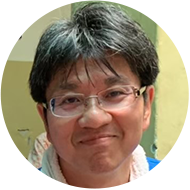
Mr. Makoto Kawami,
Deputy Executive Director
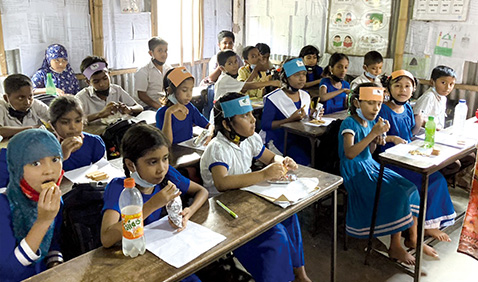
“In the beginning, some parents had negative feelings about the school, saying that ‘it would take away their vital agricultural labor’ and that ‘girls would get married-off anyway’. However, as the generation educated at the small private school became parents, more and more began to ask for an education for their children.”
Today, ACEF supports the operation of a preschool, a five-year unofficial primary school (outside the official school system), and a vocational school. “Our graduates include a woman who studied at the graduate school of University of Dhaka and was promoted to branch manager of a state bank, a man who works as an engineer for a Japanese company, and a woman who is studying at a Japanese university.”
ACEF has provided study tour opportunities for more than 800 Japanese high school and university students. Former Executive Director, Mr. Tetsuro Oda, expressed, “I want people to deepen their dialogue with themselves as they experience the heat and smell of the local environment, taste spicy curries, and witness the realities of poverty and the lives of children and farmers.” Among the participants, some have pursued careers in international development research, worked for organizations such as the United Nations and UNICEF, become doctors, pastors, journalists, or development consultants.
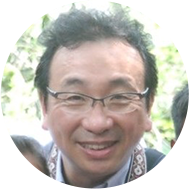
Tetsuro Oda,
Former Executive Director
Clarifying Problems Through Organizational Diagnosis
Workshops Created A sense of Responsibility
Meanwhile, ACEF’s operations have been in crisis for nearly 20 years.
“Since the 2000s, Bangladesh has experienced remarkable economic development, and almost all children have begun to receive primary education. However, we were still doing the same activities we had been doing since our founding. By around 2004, the number of schools that we supported reached 90, and the budget exceeded 50 million yen, but since then the number of schools that we could support decreased. We could no longer secure that kind of budget.” Mr. Kawami recalled.
Mr. Oda served as Executive Director from 2019 to 2022, when ACEF’s very existence was in jeopardy.
“The over 1,000 members who had been supporting our activities since the establishment were aging. We depended on their membership fees and donations for 80-90% of our income. In addition, our local partner NGO, with whom we were supposed to have an equal relationship, was 95% dependent on remittances from ACEF for its income. In a sense, we were in a ‘vertical relationship’. After the terrorist attack on a restaurant in the capital, Dhaka, in 2016, we had to temporarily suspend our study tours. And in 2020, we were caught up in the coronavirus pandemic. ACEF found itself at a crossroads where it had to rebuild its organization.”
For this reason, ACEF applied to the “Panasonic NPO/NGO Support Funds for SDGs” and received a grant to strengthen its organizational foundation from 2020 to 2021.
“In the first year, we conducted an organizational diagnosis with the help of external people to identify the problems facing our organization. Instead of presenting the visible problems and their immediate solutions, we held a workshop based on a “systems thinking” approach to structurally understand how the underlying causes of each problem are intertwined and to create new changes. This allowed each of us to develop a sense of responsibility for our problems.”
Each workshop was attended by 20 to 30 people, including board members, councilors, members, office staff, and student volunteers. “After a while, we shifted the workshop online so that people from distant locations could participate and engage in in-depth discussions about what our goals were and whether they would be successful in the real world,” said Mr. Kawami.
Utilized Online During the Coronavirus Pandemic
Interest and Donations From the Younger Generation Increased
In the second year, ACEF worked to address organizational problems identified in the organizational diagnosis. One of these was a lack of communication with the partner NGO. To address this problem, Mr. Oda visited Bangladesh in March 2020 to hold a workshop with them.
“We gathered all the NGO staff, told them frankly about the difficult situation ACEF was facing, and asked for their opinions. Even after the workshop, the boards on both sides continued to have online discussions, which led to a common understanding of our new direction, and they began to propose what they wished to undertake themselves.”
One of the new projects that emerged from this process was microfinancing (small loans) to women for educational purposes. “It is a mechanism whereby the local NGO provides small loans to parents and teachers to start small businesses, and the profits are used to pay for the children’s education. Furthermore, they agreed to reduce their dependency on ACEF by half within five years by establishing connections with local Japanese companies as new partners and exploring potential grants from the Bangladesh government.”
Through the dialogue during the workshop, ACEF formulated a new vision and mission, with the keyword “respecting the dignity of each individual” at its core. “We have shared this vision and mission at general meetings and member forums, and we have asked the schools where our board members and councilors teach to include a program on human dignity in their classes.”
ACEF has also made progress in another challenge, the generational change of board members. “We took into account gender balance and increased the ratio of women on the board to half. The local NGO also replaced its Executive Director and hired more female staff, which has improved the NGO’s openness, where people can easily express their opinions, and consequently improved the quality of communication.”
In addition, Mr. Kawami said that when study tours could not be conducted due to the coronavirus pandemic, volunteer high school and university students started crowdfunding and online seminars, which increased interest and donations from the younger generation. The funds raised were used for activities such as providing libraries for unofficial primary schools and scholarships. “We are now implementing an initiative to encourage children in kindergartens and elementary schools in Japan to make friends with children in Bangladesh through video and letter exchanges.”
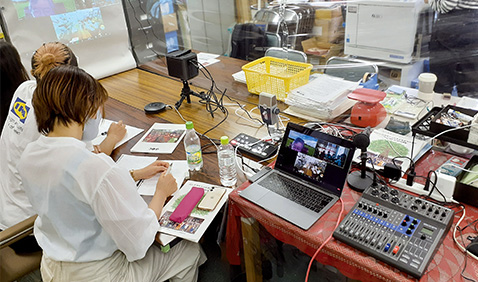
Japanese university students disseminating information
online during the coronavirus pandemic.
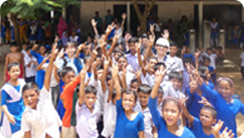
(Organization Profile)
A Certified NPO, The Asia Christian Education Fund (ACEF)
Based on the Christian spirit, ACEF works with an NGO in Bangladesh to support primary education and vocational training for Bangladeshi children. ACEF also works to develop Japanese youth who are interested in social issues in Asia.

